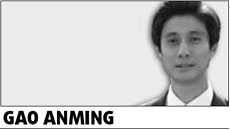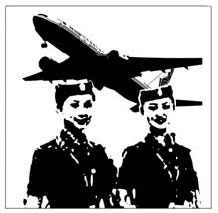'Triangular affair' heats up again
Updated: 2008-01-25 07:31
The "triangular affair" among China Eastern, China National Aviation Corp (CNAC, the parent company of Air China) and Singapore Airlines was once again in the spotlight after CNAC formally proposed to buy 2.99 billion H shares of China Eastern for no less than HK$5 a share, 30 percent more than a previous offer from Singapore Airlines.

Following an aggressive public relations campaign and a surprisingly generous last-minute counter proposal, CNAC successfully incited a rebellion among most of China Eastern's H and A share holders on January 8, when the latter's plan to side with Singapore Airlines and Temasek was overwhelmingly rejected.
I am not a shareholder of either Air China or China Eastern, so I will not take the trouble to ponder whether the rejection will usher in higher share prices after several rounds of wrestling between the parties involved, or, on the contrary, cause a slump because China Eastern is unlikely to take the CNAC offer after an embarrassing defeat.
But I am a member of both airlines' mileage clubs. As a traveler, I have lots of grievances about their services - for example, frequent flight delays, and I seriously doubt there would be substantial improvements in services if Air China aligned with China Eastern.
China Eastern has been burdened by an extraordinarily high liabilities-to-assets ratio - more than 94 percent - with net assets of only 0.85 yuan per share, much lower than the Singapore offer of HK$3.8. This has stifled its capacity to expand in the world's fastest growing air travel market. Its service is the cause of many complaints.
To be fair, Air China is doing somewhat better. As a national flag carrier and an official sponsor of the Beijing Olympics, Air China enjoys better management, higher seat occupancy and fatter profit margin. However, neither is as good as Singapore Airlines in terms of services, punctuality, efficiency and profitability.

If China Eastern does bow to the aggressive CNAC and accept either a merger or an alliance of some sort with Air China, a super carrier will come into being. But I suspect it would more likely be "super" in scale, rather than "super" in efficiency or service.
A partnership between Singapore Airlines and China Eastern, on the other hand, would introduce management know-how and higher service standard. Such a team-up would also bring more competition to the domestic market, which, in turn, would not only help domestic players evolve into real super carriers, but also provide more choices for consumers like me.
The Chinese market is large enough to accommodate several super carriers. It now has "3+1" bigger airlines (China Southern and Hainan Airlines in addition to the above two), plus some smaller ones.
Air China, now allying with Cathay Pacific, is already No 1 in the country in scale, dominating the Beijing and Hong Kong hubs. If it swallows China Eastern, it will seize the Shanghai market as well. Such a colossal structure will prove too big for any of its competitors, prompting concerns of a monopoly. That would not be an outcome the authorities would like to see. Nor would it benefit travelers.
China Eastern has been quick in taking action. On Tuesday, it inked a deal with China Southern, second only to Air China in scale, to start comprehensive cooperation in all fields. Apparently, China Southern will not sit idle in the face of the emergence of a super competitor. And there is still a possibility Singapore Airlines will increase its offer so as not to be left out of the booming Chinese market.
The drama will continue to unfold. I do hope travelers will benefit from more competition, and that the whole aviation industry will prosper following the reshuffle.
E-mail: gaoanming@chinadaily.com.cn
(China Daily 01/25/2008 page8)
|
|
|
|
|
|